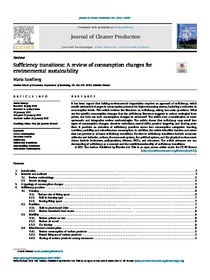Ufficiency transitions: a review of consumption changes for environmental sustainability

2021
293
1-16
sustainable development ; consumption ; consumer behaviour ; climate change
Economic development
https://doi.org/10.1016/j.jclepro.2021.126097
English
Bibliogr.;Charts
"t has been argued that halting environmental degradation requires an approach of sufficiency, which entails substantial changes in consumption patterns for high-consuming classes, including a reduction in consumption levels. This article reviews the literature on sufficiency, asking two main questions: What are the specific consumption changes that the sufficiency literature suggests to reduce ecological footprints, and how can such consumption changes be advanced? The article uses a combination of semi-systematic and integrative review methodologies. The article shows that sufficiency may entail four types of consumption changes: absolute reductions, modal shifts, product longevity, and sharing practices. It provides an overview of sufficiency practices across four consumption categories: housing, nutrition, mobility, and miscellaneous consumption. In addition, the article identifies barriers and actors that can prevent or advance sufficiency transitions. Barriers to sufficiency transitions include consumer attitudes and behavior, culture, the economic system, the political system, and the physical environment. Actors include businesses, policymakers, citizens, NGOs, and educators. The article advances our understanding of sufficiency as a concept and the multidimensionality of sufficiency transitions."
Digital
The ETUI is co-funded by the European Union. Views and opinions expressed are however those of the author(s) only and do not necessarily reflect those of the European Union or the ETUI.